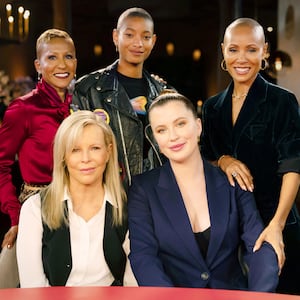It’s a frequent phenomenon in pop culture that, once a celebrity is “canceled”—which, according to right-wing pundits and most famous people means having all your money stolen before being launched into space—all they have to do is hide out in their mansion for a few months or maybe just log off from social media before eventually appearing in public again and putting out projects reflecting on their cancellation to regain support, thereby un-canceling themselves. If they were ever truly canceled in the first place.
This form of irony runs through Stassi Schroeder’s new book Off With My Head: The Definite Basic Bitch Handbook to Surviving Rock Bottom, which, in part, details her experience being “canceled”—as she consistently refers to it— following her highly publicized termination from Bravo’s hit reality series Vanderpump Rules in June of 2020. It turns out that if you’re white and influential enough, you can not only make a “mistake” that could permanently alter a Black person’s life and, most likely, traumatize them forever but profit off of that wrongdoing in the form of a book published by Simon & Schuster, in which you proudly compare yourself to Marie Antoinette and insist that Beyoncé would never cancel anyone.
Off With My Head isn’t entirely dedicated to the aftermath of Schroeder’s firing, not that a whole book on the subject matter would be of benefit to anyone—certainly not Faith Stowers. But it’s notable that her brutally honest, self-described “basic bitch” persona and personal experiences outside of the incident are apparently still of value to consumers, as she writes about her journey with motherhood and her recent marriage to Beau Clark, gives music recommendations—including a song from the Marie Antoinette soundtrack, if you already didn’t get the parallels she’s trying to draw—enlightens readers on her experience becoming a homeowner, and discusses the importance of crying.
But before Off With My Head leans into Bossypants territory, Schroeder cuts right to the chase, chronicling the “seven days of destruction” that ensued following the re-emergence of a previous scandal that would lead to her firing.
For those uninitiated in Bravo mess, it had been public knowledge for several years that Schroeder and a few of her Vanderpump Rules co-stars, including Kristen Doute and Lala Kent, viciously harassed their Black castmate Faith Stowers, including calling the cops on her, after it was revealed that she had slept with Jax Taylor (who was dating his now-wife Brittany Cartwright at the time) in Season 6, thanks to Schroder bragging about it on a podcast. However, the cable network didn’t take action until the story re-emerged during the Black Lives Matter protests of 2020, when Stowers spoke about it in an interview. The network completely severed ties with Schroeder and Doute, who were supposed to be featured in a spin-off with the show’s older cast members.
The most credit I can give Off With My Head is when Schroeder highlights how her behavior was allowed to thrive on a very white show like Vanderpump Rules—and thus in her white friend group—without much reprimand or pushback. (Although her castmate Ariana Madix called her out on the show for offensive comments she made on her podcast criticizing #OscarsSoWhite). This isn’t included in the book, but Andy Cohen even told her on Watch What Happens Live, when her statements about the Oscars were brought up, that he liked how “outspoken” she was.
As much as Bravo likes to reduce its problems regarding race to individuals, the network has long facilitated environments where that behavior is not only acceptable but entertained. Schroeder doesn’t outline this fact intentionally. It more so reveals itself through all of her recounting and complaining about the scandal.
That said, Schroeder’s perspective on the incident involving Stowers is precisely that of a white woman who hired a personal diversity coach (which she admits in the book), spent months consuming podcasts, books and documentaries on the Black experience, and clearly memorized a lot of anti-racist language along the way but still doesn’t really get it. She acknowledges her privilege several times and refers to her “unconscious bias.” In an effort to center Stowers’ experience without acknowledging her own racist motivations that sparked the incident, she writes, “while Kristen and I didn’t feel like the situation was about race, it was for Faith, and because of that it was about race.”
It becomes clear that Schroeder primarily believes that she “handled” the situation incorrectly, not that she is, in fact, racist. She writes that she and Kristen’s attempts to frame Stowers for theft were wrong because they didn’t “witness Faith stealing anything” and weren’t “100 percent sure” the female robber they tried to match Stowers to in a Daily Mail article wasn’t her, as if they were genuinely trying to seek some justice. It should also be said that trying to get a Black person arrested because you’re bored and want to play detective is also an extremely harmful, racist thing to do and that they should’ve minded their business altogether.
She also points to being ignorant about Black people’s historical and present relationship with the police as her downfall in the situation but seems to view her actions as separate from a conscious act of racism. There’s no real interrogation of why she was so eager to put a Black woman in such a severe, life-threatening circumstance or why she didn’t recognize the optics of a group of white people coming after a Black woman while Taylor got a few slaps on the wrist. About the incident she says, “I was wrong. I just need people to understand that this wasn’t about her race.”

Schroeder spends a lot of the book projecting self-awareness by repeatedly acknowledging that her “cancellation” is entirely her doing. “I know I’m the only one to blame,” she writes early on. “I’m not saying I deserve sympathy or pity,” she states later. “Again, I know I am not blameless here,” another line says. It reads as perfunctory and like a chore as opposed to genuine acceptance of any consequences, especially when she goes on to criticize “cancel culture” for not allowing “people space to figure things out and make mistakes”—as if she wasn’t given a book deal just so she could figure out her racism and get paid for it. It’s also terrifying to imagine how much more space white people need to “figure out” their racism if trying to orchestrate the arrest of an innocent Black person isn’t enough.
In sum, Off With My Head is akin to those 1,000-word self-reflections white people were posting on Instagram during BLM about their own prejudice that benefited absolutely no one. There’s a few pages of interesting behind-the-scenes details regarding Vanderpump Rules, if you’re interested in a bit of oral history on the show. If you’re someone who cares about Schroeder’s insights on motherhood, I guess this book is for you. The rest makes you upset that Schroeder is able to profit off of this incident while Stowers gains nothing from being some white person’s teachable moment. Surprisingly, you might also walk away feeling bad for Marie Antoinette, as she’s invoked repeatedly throughout this book in the cheesiest fashion, particularly in this one notably bad but earnest quote:
“Marie Antoinette was once the most hated woman in France. And for a while I was the most hated person on the Internet, which is not nearly as glamorous.”


